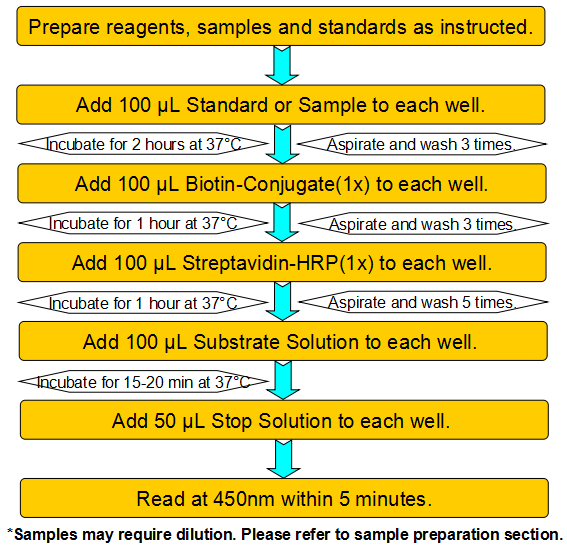Product Details
| Species Reactivity |
N/A |
| UniProt |
N/A |
| Abbreviation |
TYL |
| Alternative Names |
N/A |
| Range |
1.5-121.5 ppb |
| Sensitivity |
1.5 ppb |
| Sample Type |
Tissue, liver, honey, etc. |
| Detection Method |
Competitive ELISA |
| Analysis Method |
Quantitive |
| Assay Duration |
1-3h |
| Sample Volume |
�1�0�-�2�0�0� μ�L |
| Detection Wavelengt |
450 nm |
Test principle
This assay employs the competitive enzyme immunoassay technique. The microtiter plate provided in this kit has been pre-coated with TYL antigen. Standards or samples are added to the appropriate microtiter plate wells with an antibody specific for TYL and Horseradish Peroxidase (HRP) conjugated TYL. The competitive inhibition reaction is launched between with HRP labeled TYL and unlabeled TYL with the antibody. A substrate solution is added to the wells and the color develops in opposite to the amount of TYL in the sample. The color development is stopped and the intensity of the color is measured.
Product Overview
Tylosin is a bacteriostat feed additive used in veterinary medicine. It has a broad spectrum of activity against Gram-positive organisms and a limited range of Gram-negative organisms. It is found naturally as a fermentation product of Streptomyces fradiae. It is a macrolide antibiotic.
Tylosin is used in veterinary medicine to treat bacterial infections in a wide range of species and has a high margin of safety. It has also been used as a growth promotant in some species, and as a treatment for colitis in companion animals.
Like other macrolides, tylosin has a bacteriostatic effect on susceptible organisms, caused by inhibition of protein synthesis through binding to the 50S subunit of the bacterial ribosome.
Components
Reagents | Quantity | Reagents | Quantity |
Assay plate (96 Wells) | 1 | Instruction manual | 1 |
Standard | 6 x 1 mL | Redissolving Solution (concentrate 2 x) | 2 x 20 mL |
Antibody | 1 x 7 mL | HRP-Conjugate | 1 x 7 mL |
Wash Buffer (concentrate 20 x) | 2 x 20 mL | Stop Solution | 1 x 7 mL |
Substrate A | 1 x 7 mL | Substrate B | 1 x 7 mL |
Adhesive Films
| 4 |
|
|
Recovery
Sample Type |
Number |
Recovery range (%) |
Average(%) |
Serum |
10 |
90-101 |
96 |
EDTA plasma |
10 |
89-97 |
93 |
Heparin plasma |
10 |
91-99 |
95 |
Precision
Intra-assay Precision (Precision within an assay)
Three samples of known concentration were tested twenty times on one plate to assess intra-assay precision.
Inter-assay Precision (Precision between assays)
Three samples of known concentration were tested in forty separate assays to assess inter-assay precision.
CV (%) = SD/meanX100
Intra-Assay: CV<8%
Inter-Assay: CV<12%
Linearity
Sample Type |
1:2 |
1:4 |
1:8 |
1:16 |
Serum |
78-89% |
81-99% |
92-103% |
95-105% |
EDTA plasma |
91-101% |
90-98% |
93-101% |
91-98% |
Heparin plasma |
92-103% |
93-102% |
92-99% |
91-101% |
Stability
The stability of ELISA kit is determined by the loss rate of activity. The loss rate of this kit is less than 5% within the expiration date under appropriate storage condition.
The loss rate was determined by accelerated thermal degradation test. Keep the kit at 37°C for 4 and 7 days, and compare O.D.values of the kit kept at 37°C with that of at recommended temperature. (referring from China Biological Products Standard, which was calculated by the Arrhenius equation. For ELISA kit, 4 days storage at 37°C can be considered as 6 months at 2 - 8°C, which means 7 days at 37°C equaling 12 months at 2 - 8°C).
Sample collection and storage
Store at 2-8°C. Please refer to Instruction Manual.
Kits storage instructions
Store at 2-8°C. Please refer to Instruction Manual.



